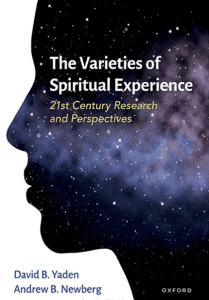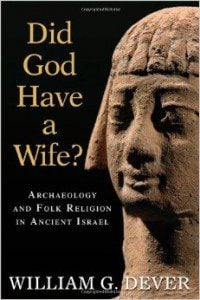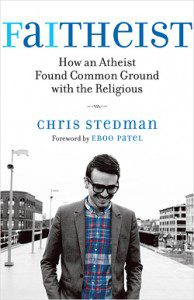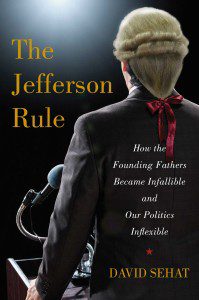I have been trying to find a way of being religious that’s still possible (or maybe the word is “decent”) for us. What would it be like to be religious without fudging our best thoughts, without repressing anything we have learned…? What would it be like to be religious when we can’t really believe any of that glorious stuff — creation ex nihilo, virgin birth, bodily resurrection — we used to believe? It’s not decent, I think, to pretend to believe it, or to do a fancy philosophical number on “belief” or on “truth” so that religion ends up relying on epistemic standards that would be laughed out of any good classroom or courtroom or laboratory….
What should it mean for us to be religious? I have answered it thus: to dwell poetically on the earth as a mortal. That the question and its proper answer might at some time be unintelligible or trivial is not to the point, so far as I can see. This our life. Should we not live it as simply and sincerely and joyfully as we can?
—James C. Edwards
Jim Edwards was one of my favorite undergraduate professors. He was also the campus atheist. There were quite a few other professors at Furman University, then and now, who would fit comfortably within the framework 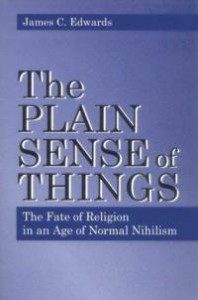 Atheist/Humanist/Agnostic, but Dr. Edwards was particularly forthright about his atheism. He wasn’t brash, arrogant, or obnoxious about his lack of traditional religious belief, but neither was he shy or ashamed. He “out of the atheist closet,” if you will.
Atheist/Humanist/Agnostic, but Dr. Edwards was particularly forthright about his atheism. He wasn’t brash, arrogant, or obnoxious about his lack of traditional religious belief, but neither was he shy or ashamed. He “out of the atheist closet,” if you will.
I took a three different philosophy classes with Dr. Edwards: “Twentieth-Century Philosophy,” “Senior Seminar on Nietzsche and Foucault,” and “Philosophy of Religion.” The “Philosophy of Religion” class was based his book The Plain Sense of Things: The Fate of Religion in an Age of Normal Nihilism. The term nihilism comes from Latin root for “nothing.” If you have seen the Coen Brothers’ film The Big Lebowski, you may recall some important plot developments involving self-proclaimed nihilists. In one of the most memorable of those scenes, The Dude, played by Jeff Bridges, is asked by a young woman named Bunny if he will blow on her toenails to help dry the recently applied toenail polish. Before doing so, he nervously asks if the nearby man floating in the pool will mind. Bunny reassures him, “Uli doesn’t care about anything. He’s a Nihilist. Looking askance at this so-called nihilist floating obliviously in the pool, The Dude, replies sarcastically about how much work it must be believing in nothing. He says, “Ah, that must be exhausting.”
Apathetic “belief in nothing” is one potential response to ‘normal nihilism.’ But it is far from the only possible response. When Dr. Edwards talks about the fate of religion in an age of normal nihilism, what he means is more a sense of ironic detachment that can pervade our postmodern world. It’s the realization of arbitrariness or historical contingency that comes from realizing that we human beings are neither the pinnacle of Creation, nor the center of the Universe. We are merely the most advanced species on one planet that is on the periphery of one spiral galaxy that is merely one galaxy among more than 100 billion galaxies in the Universe. Similarly, it’s been said that Darwin made atheism respectable by giving us a way of explaining how complex life could evolve from simpler life without divine intervention.
From the perspective of normal nihilism, in our pluralistic, postmodern world there is not one clear overarching singular right way of acting or believing. And to use one of Dr. Edwards’ favorite metaphors, all of our various philosophic or religious paths — whether Christianity or Paganism, Secular Humanism or Buddhism — can each begin to seem like just one more store in the “shopping mall” of our life (49-55). Each hopes to attract our time, attention, and money, but all have increasing difficulty making a case that they have access to “Capital T” Truth once and for all in a way that will satisfy all people for all time — whatever that would even mean in a Universe that is 13.7 billion years old and counting.
Looking specifically at traditional Western religious language from the perspective of normal nihilism, the word “God” also begins to look like just one more historically contingent word in a human language. And even human language itself is just another historically contingent phenomenon. If, in some sense, God does exist sense, we can be assured, as the late Unitarian Universalist ministry Forrest Church liked to say that, “‘God’ is not God’s name.”
We Unitarian Universalists draw explicitly from six different sources, some of which are traditionally theistic (and use some form of the word God) and some which are non-theistic or atheistic. In recent weeks and months, I’ve enjoyed reflecting with many of you about how we structure our worship service, why we worship the way we do, and ways we might consider worshipping differently. I have no illusions of being able to please everyone completely all of the time. As the joke goes, where there are three Unitarian Universalists, there are at least eight opinions. But I am open to experimenting with what helps create, in the language of our UU Principles, “spiritual growth in our congregations” and “A free and responsible search for truth and meaning.”
One example of these ongoing discussions in recent weeks has been changing the congregational response to the “Sharing of Joys and Sorrows” from a spoken “Unison Affirmation” to the singing of the hymn “Spirit of Life.” Music can be much more powerfully resonate and comforting than words alone. And unlike the term “God,” “Spirit of Life” has a lot less baggage, and can be interpreted from theistic or atheistic point of view. From a theistic perspective, “Spirit of Life” could be understood to be a more palatable name for “God” — for that sense of something larger than yourself that calls you to compassion, justice, and freedom. In contract, from an atheistic or religious humanist perspective, “Spirit of Life” could be understood as the awe inspiring wonder of finding ourselves here on the this planet — awake, and alive — if only for a short time in the grand scheme of things.
Another change that we made this morning was to the words we use to sing our children to Religious Education. We have changed the line “May the love of God surround you” to “May the Power of Love surround you.” I was also interested to learn that many of you have been covertly making similar changes to the lyrics for years, singing at least for yourself, alternative words such as “May the love of All surround you.” One of many reasons I personally have no problem with changing the lyrics to “May the Power of Love Surround You” is that we have adults in this congregation who are atheists, with good reasons for their view, as well as many parents in this congregation who are raising their children to be atheists — but who nonetheless deeply value religious community. These individuals typically value, in particular, the Fifth Source of UUism: “Humanist teachings which counsel us to heed the guidance of reason and the results of science, and warn us against idolatries of the mind and spirit.” But there are, of course, five other sources of UUism, some of which tend more toward various forms of theism. And if you flip through our two UU Hymnals, you’ll find many references to “God.” So to the consternation of some and for the reassurance of others, you will still hear the word “God” sometimes here at UUCF, but the substitute “Power of Love” is arguably more helpful for the weekly singing our children to Religious Education because it matches the language more consistently used in the curriculum they use such as “Spirit of Life” or “Spirit of Love and Mystery.”
For those of you who follow politics closely I suspect this whole discussion invokes memories of the Orwellian moment in the recent Democratic National Convention, when the moderator, acting as “Big Brother,” railroaded the reinsertion of the word “God” back into the Democratic Party platform. But honestly the whole matter was overblown. Even before the word God was reinserted, the platform already mentioned “‘faith’ 11 times, ‘religion’ or ‘religious’ nine times, ‘church’ two times and `clergy’ one time.” So much of how the word “God” is used by almost all politicians involves cynical political pandering and bad theology — such as the unspoken rule that all political speeches must end with some variation of “God bless you, and may God bless the United States of America.” If we have to bring God into politics, how about “God bless the people of every nation?”
Politicians know that the United States is a highly religious nation in which Gallup polls show that 90% of Americans profess to believing in God, which is a number that has held steadily, with only a slight decrease, since the 1940s. More than 9 in 10 Americans still say “yes” when asked the basic question “Do you believe in God?”; this is down only slightly from the 1940. However, 20% to 30% of Americans will admit that there is an element of “doubt” mixed in with their belief in God. And about 12% of Americans who believe in God, if given the choice, prefer to say “they believe in a universal spirit or higher power instead of in ‘God.’”
I’m particularly interested in this growing demographic that is open to nuance in their theology. It’s precisely that demographic that may find language such as “Spirit of Life” or “Power of Love” to be a refreshing alternative to the baggage that can come with the more traditional word “God.” Along these lines, some of you may have seen the October 1st headline in USA Today, “Unitarian faith growing nationwide: Unitarian Universalist congregations hold growing appeal throughout the U.S.” The article reported that Unitarian Universalism “grew nationally by 15.8% from 2000 to 2010.” Relatedly, our current new member class here at UUCF includes 16 potential new members, which is always welcome news.
For me, as a recent convert to Unitarian Universalism, and I suspect for increasing numbers of other people, UUism presents a unique opportunity to build a religion that is truly relevant to the best of twenty-first century knowledge and experience. Related to the challenge of being relevant to twenty-first century knowledge and experience, some of you may have seen headlines this past week of “Albert Einstein’s ‘God Letter’ expected to sell…at auction: A letter handwritten…a year before his death, expressing his views on religion, will be sold on eBay this month with an opening bid of $3 million….”:
Einstein wrote the letter in German on January 3, 1954, on Princeton University letterhead to philosopher Erik Gutkind after he read Gutkind’s book Choose Life: The Biblical Call to Revolt. [In the letter he wrote,] “The word God is for me nothing more than the expression and product of human weaknesses, the Bible a collection of honorable, but still primitive legends which are nevertheless pretty childish. No interpretation, no matter how subtle, can (for me) change this.” As the quote above from Dr. Edwards asks, the question before us is “What would it be like to be religious without fudging our best thoughts, without repressing anything we have learned….”
Or consider the quote on the cover of your Order of Service from Laila Ibrahim, who is the Director of Children and Family Ministries at First Unitarian Church of Oakland, California. This quote appeared on a a t-shirt a few years ago for the UU Young Adult Network. It read: “It’s a blessing each of us was born. It matters what we do with our lives. What each of us knows about god is a piece of the truth. We don’t have to do it alone. Unitarian Universalism.” One of my goals for us here at UUCF is to come up with a short slogan for our congregation. Ibrahim’s words are a longer than I would prefer for a slogan, but they are also strong and compelling. Notice also that she made the word “god” lower-case, perhaps as an indication that she means the word “god” to be different, broader, or more inclusive than the traditional God of theism.
But despite our best intentions of trying to redefine terms, for many people, the word “God” has a lot of baggage. For many people the word “God” almost inevitably brings to mind an image of an old white man with a beard, like Zeus or like the figure in Michelangelo’s painting on the Sistine Chapel ceiling of an old gray-haired white man reaching out his finger to Adam. The word “God” also almost inevitably connotes some of those classic Greek philosophic categories of omniscient, omnipotent, all-good, all-loving, etc.
However, I’m not convinced that classic Greek philosophical categories are necessarily helpful to us in regard to what we are trying to say (or should be trying to say) when and if we use the word “God.” One of the long-standing criticisms of “God,” as traditionally understood, has been the problem of the existence of evil: how can an All-Knowing, All-Powerful, All-Good God permit evil to exist such as widespread child abuse, war, and natural disasters. (If God is omniscient, then God knows about evil. If God is omnipotent, God can do something about evil. If God is good, then God would want to do something about evil. Therefore, the argument goes, God does not exist — at least not the God of one strand of Greek philosophy.)
In contrast, I invite you to consider that our definition of the word “God” has perhaps been constrained in a few different ways. I would like to explore two of those ways with you this morning. First, our view of God has been too constrained in the insistence that God must be the perfection of those traditional Greek philosophical categories.
It has sometimes been said that if humans have self-aware knowledge, then it must derive from an All-Knowing God. If humans have power, then it must derive from an All-Powerful God. And if humans have a capacity for goodness, then it must derive from an All-Good God. A major problem with this whole line of thinking is that it is exceedingly anthropomorphic — that is, it creates God in the image of humanity. As Voltaire said, “If God has made us in God’s image, we have returned the favor.”
After Copernicus, Darwin, and Einstein we know that we humans are not “a little lower than the angels,” but merely “a little higher than the apes.” We are neither the pinnacle of all Creation, nor the center of the Universe. We are merely the most advanced species on a planet that is on the periphery of one spiral galaxy that, in turn, is merely one galaxy among more than 100 billion galaxies in the Universe. So, in this postmodern age of “normal nihilism” in which we are faced with the radical historical contingency of our very existence, envisioning “God” as a projected perfection of our perceived best traits as a species seems increasingly untenable.
Along these lines, we earlier heard in Einstein’s letter that “The word God is for me nothing more than the expression and product of human weaknesses.” (Freud would agree.) But during the final year of Einstein’s life he also spoke about a desire to “experience the universe as a single cosmic whole.” That desire sounds a lot like our Seventh Principle about the “interdependent web of all existence.” And such an approach can potentially help us solve the traditional problem of the existence of evil. A “single cosmic whole” or “interdependent web of all existence” necessarily includes everything: creation and destruction, what we humans perceive as “good” and what we perceive as “evil.” Here perhaps we Westerners have some lessons to learn from some strands of Hinduism, which include the ‘Hindu Trinity’ of Brahma (“the creator”), Vishnu (“the sustainer”) and Shiva (“the destroyer/transformer”) — all as vital aspects of what can be meant by the word “God.”
This rejection of God as a separate Supreme Being, who is out there somewhere, is related to a second way that our view of God has perhaps been too constrained: the insistence that God is a noun. It would perhaps be much better to say that God is more like a verb. Perhaps we should be talking about godding (as a act we can do or process we participate in), not god (as a static, unchanging thing out there somewhere). Here I think the Buddhists get it right that everything is in a state of impermanence, flux, and evolution — and to resist this truth that everything is changing, including “God,” is to create suffering for yourself and for others. Indeed, much suffering has resulted from various groups insisting they know exactly how God is, has always been, and will always be. The corollary is that everyone for all time must conform to this unchanging divine standard (proclaimed by humans). Such claims deny the messy complexity of historical reality.
One way that we Unitarian Universalists have sought to resist this trap is by not having a creed that everyone has to espouse belief in. Instead of an orthodoxy, we have Principles and Sources that try to shape a process of building religious community that is as inclusive and diverse as possible. The downside is that our Principles and Sources are all process and no testimony. In the words of a former UUA President, “they describe a process for approaching the religious depths but they testify to no intimate acquaintance with the depths themselves.”
Testimony is an old evangelical word for telling your story of spiritual growth, but perhaps it is a word we Unitarian Universalists could benefit from reclaiming on our own terms. Our First Source adamantly affirms “Direct experience of transcending mystery and wonder” as a primary source for Unitarian Universalism, but it doesn’t necessitate sharing our direct experience with others. And we should be honest that testifying about our firsthand experience can be intimidating in UU settings. Many UUs are hardline rationalists and skeptics. But rationalists need to be challenged by mystics and vice-versa. The rationalist tendency can be to criticize alleged spiritual experiences without ever testing them for his or herself. That’s the equivalent about writing a book all about apples without ever tasting an apple for yourself. At the same time, mystics can gain perspective from having their firsthand experiences evaluated through the rational tools of neuroscience, history, anthropology, psychology, and sociology.
There is much more I would like to say about the challenge of finding a “language of reason and reverence” that is worthy of twenty-first century knowledge and experience, but for now this sermon needs to draw to a close. I’ll end by sharing with you a brief testimony from my own direct experience. As an undergraduate double major in Religion and Philosophy, I gave serious thought to following in Dr. Edwards’ footsteps and pursuing graduate work in contemporary continental philosophy.
I also thought about becoming a religion professor. In the end, I felt more strongly called to become a minister. As much as I benefit from academic theory, I am even more interested in experimenting with how much we can change the world for the better not in theory, in my head, or in a book, but in cities like Frederick and in congregations like UUCF. But I don’t think I came to that decision completely on my own.
During my senior year in college, I was typing the final piece of paperwork for my application to Harvard Divinity School. The rest of my application and references had already been mailed in. Suddenly, I got this firm and distinct sense of “No.” This is not for you. And although I’m a person who normally weighs major decisions extremely carefully over a period of time, I immediately stopped filling out the application, and have never regretted not mailing it in.
To be clear, I did not hear a audible booming voice, “Carl, do not apply to Harvard Divinity School,” but that’s because God doesn’t have James Earl Jones’ voice. And there are plenty of times that I have weighed decisions within myself, but this occasion felt different. It felt weightier, solid, definitive. And I had a real sense of peace afterward about the decision not to apply.
Was that experience “God” speaking to me? Was it the “Power of Love” or the “Spirit of Life,” prompting me toward the path that would be more life-giving to me and others? Honestly, there’s no way to test or prove it for sure from our finite human perspective because there is no way to replicate it over and over in a laboratory setting. But that experience and others like it are part of my understanding of that First Source of UUism: “Direct experience of that transcending mystery and wonder.”
William James, one of my favorite theologians, calls God the “MORE.” I take that to mean, at minimum, that there is much more to the universe than we know or perhaps can know. Although there are times when it is helpful to discuss our beliefs at an objective, rational, verifiable level, it is equally important to create safe spaces in which we can talk about our subjective, direct experience: those things that we know are true because they have happened to us, even if we can’t prove it definitely. In that spirit, I invite you to be open to the “More” that might break in through your preconceived notions of what is possible. I invite you to consider what it might mean to focus on becoming as much as on being, on participation as much as perfection, on godding more than God.
In a few moments, I am going to invite us to sing the hymn “Spirit of Life” once more. Whether you listen with theistic or atheistic ears, I invite you, as you sing, to listen to the lyrics as if for the first time. Be especially attentive to what word or phrase particularly stands out to you this morning. It might be a different word or phrase than you expect.
After we finish singing, there will be two minutes of silence. During that silence, I invite you to reflect on the word or phrase that most stood out to you from the lyrics of “Spirit of Life.” You may even find yourself having a direct experience of something More:
Spirit of Life, come unto me.
Sing in my heart all the stirrings of compassion.
Blow in the wind, rise in the sea;
Move in the hand, giving life the shape of justice.
Roots hold me close; wings set me free;
Spirit of Life, come to me, come to me.
Notes
1 I have heard the suggestion that we need a “moratorium on the word God” attributed to various theologians from Harvey Cox to Paul Tillich. See, for example, Cox, The Secular City: Secularization and Urbanization in Theological Perspective (1965), 266-267. Cox has continued to revise his secularization of religion theories in light of the unfolding historical reality in books such as Religion in the Secular City: Toward a Postmodern Theology (1985) and The Future of Faith. See also Charles Taylor’s magisterial 2007 book A Secular Age.
2 James C. Edwards, The Plain Sense of Things: The Fate of Religion in an Age of Normal Nihilism, 195, 239.
3 Carl Sagan, Billions & Billions: Thoughts on Life and Death at the Brink of the Millennium, 56.
4 To discuss more about how we can and should understand ourselves in light of the 13.7 billion year old “Universe Story,” join us at UUCF on Tuesdays at 7:00 p.m. for a free, DVD-based Journey of the Universe class, led by Rev. Carl: http://www.journeyoftheuniverse.org/.
5 For an example, “Allah,” is also not God’s name; Allah is merely the Arabic word for God. If you were a theist of any religion speaking Arabic, the word you would use for God is Allah. The word “Allah” is not exclusive to Islam.
6 For more on the history of the song “Spirit of Life,” visit http://www.uuworld.org/life/articles/35893.shtml.
7 The word count about the DNC platform is from Melanie N. Roussell, national press secretary for the Democratic National Committee in the article “Under pressure, Democrats restore `God’ to party platform,” available at http://www.religionnews.com/politics/election/Under-pressure-Democrats-restore-God-to-party-platform.
For more on the Orwellian dynamic of railroading the change, see “Democrats’ Efforts To Reinsert ‘God’ And ‘Jerusalem’ Into Platform Met With Loud Opposition (VIDEO),” available at http://www.huffingtonpost.com/2012/09/05/dnc-god-jerusalem-platform_n_1859200.html. The upshot is “Even though the no’s were again as loud if not louder than the aye’s on the third vote, Villaraigosa said he had determined that two thirds of those present had voted in favor. Boos filled the arena in response.” Jon Stewart’s coverage of this debacle is available at
Also, see Stephen Prothero, “When it comes to ‘God’ in our political platforms, less is more”: http://religion.blogs.cnn.com/2012/09/06/my-take-when-it-comes-to-god-in-our-political-platforms-less-is-more/.
8 I owe the phrase “God Bless the People of Every Nation” to the singer-songwriter David Lamotte, although I do not think that phrase is original to him.
9 For the Gallup poll data, see http://www.gallup.com/poll/147887/americans-continue-believe-god.aspx.
10 For the USA Today article, see http://www.usatoday.com/story/news/nation/2012/10/01/unitarian-faith-growing-stronger-nationwide/1607243/. The data is from the Association of Statisticians of American Religious Bodies.
11 For more on Einstein’s letter, visit http://www.telegraph.co.uk/news/religion/9583331/Albert-Einsteins-God-Letter-expected-to-sell-for-2m-at-auction.html.
12 I owe my critique of traditional theism to a field of thought known as Process Theology. For more, see David Ray Griffin, Reenchantment without Supernaturalism: A Process Philosophy of Religion (Cornell Studies in the Philosophy of Religion) and Whitehead’s Radically Different Postmodern Philosophy: An Argument for Its Contemporary Relevance (SUNY Series in Philosophy).
13 At least according to Wikipedia, the original French for the Voltaire quote is “Si Dieu nous a faits à son image, nous le lui avons bien rendu” from his Notebooks (c.1735-c.1750).
14 For constructive responses to religious critiques from Freud and others, see Merold Westphal’s Suspicion and Faith: The Religious Uses of Modern Atheism.
15 http://www.telegraph.co.uk/news/1951333/Einstein-thought-religions-were-childish.html
That sounds like a gesture toward a new kind of religion worthy of the twenty-first century — quite similar to the UU Seventh Principle of “the interdependent web of all existence of which we are a part.”
16 On “God” including what appears to be both “good” and “evil” from a human perspective, see the work of theologian Bernard Loomer (1912-1985). The following is a quote about Loomer’s theology from Bruce Epperly’s book Process Theology: A Guide for the Perplexed:
Rather than being fully and unambiguously good, as most process theologians assert, Loomer’s God is the ambiguous energy of creation, seeking the fullness of life, yet embracing both the creative and destructive aspects of the universe. According to Loomer, a fully concrete God of sufficient stature must be identified with the whole of life and not just the positive and life-supportive aspects of creation (14-15).
See also Friedrich Nietzsche, On the Genealogy of Morality: A Polemic.
17 My critique of “God” as a reified noun also comes from Process theology. The alternative formulation that “God is a Verb” is attributed to Buckminster Fuller in Mary Daly’s groundbreaking 1973 book Beyond God the Father: Toward a Philosophy of Women’s Liberation, 204, fn 32. “Godding” is the title of a Virginia Ramey Mollenkott 1987 book about Human Responsibility and the Bible. And Carter Heyward plays with all these ideas in her book Saving Jesus From Those Who Are Right: Rethinking What It Means to Be Christian.
18 Many groups that oppose same-sex marriage base their argument on a false notion that so-called “Biblical Marriage” is exclusively between one man and one women when even a cursory view of the Bible or history shows that marriage is a messy history of diversity and change.
19 The former UUA president mentioned is Gene Picket, quoted in a collection of UU essays titled A Language of Reverence, edited by Dean Grodzins, 3. See also Jeanne Harrison Nieuwejaar, Fluent in Faith: A Unitarian Universalist Embrace of Religious Language and William R. Murry, Reason and Reverence: Religious Humanism for the 21st Century.
20 For more on contemporary continental philosophy, see a book recently published by Dr. Edwards’ successor at Furman, J. Aaron Simmons, God and the Other: Ethics and Politics after the Theological Turn (Indiana Series in the Philosophy of Religion).
21 For a social-constructivist perspective on discerning how and why we may think we hear “God,” see T.M. Luhrmann’s new book When God Talks Back: Understanding the American Evangelical Relationship with God. Luhrmann is a Harvard- and Cambridge-educated psychological anthropologist and a professor in the Department of Anthropology at Stanford University.
22 In the Varieties of Religious Experience, William James writes of the possibility of becoming “conscious that this higher part [of one’s self] is coterminous and continuous with a MORE of the same quality, which is operative in the universe outside of [one’s self], and which [one] can keep in working touch with, and in a fashion get on board of and save [one’s self] when all [one’s] lower being has gone to pieces” (454).
23 William James also famously said that “It takes only one white crow to prove that all crows are not black.” Quoted in David Ray Griffin, Parapsychology, Philosophy, & Spirituality: A Postmodern Exploration (Constructive Postmodern Thought).
The Rev. Dr. Carl Gregg is a trained spiritual director, a D.Min. graduate of San Francisco Theological Seminary, and the minister of the Unitarian Universalist Congregation of Frederick, Maryland. Follow him on Facebook (facebook.com/carlgregg) and Twitter (@carlgregg).
Learn more about Unitarian Universalism:
http://www.uua.org/beliefs/principles/index.shtml







